
Thursday, December 17, 2009
Travel Tips
As I’ve been reflecting on my recent travels through
1) You’re probably busy and thinking about a lot of other things, so its best to mentally prepare as you’re hastily skimming through a guidebook a few hours before you arrive and you realize you know next to nothing about this place.
2) Don’t calculate an exchange rate in advance, rather just work it out in your head right after you get change from someone and then you can figure out later by how much he defrauded you.
3) Try to arrive at the bus station at least 30 seconds before the bus leaves [this was only a 3 hour bus ride that cost about $5, for my major bus rides I was there about an hour early].
4) If you are in a country such as
5) Don’t top up your airtime in advance when the price is set and it’s readily available, but wait until you are potentially almost out—and hence stuck with no way to contact anyone—and the credit is almost completely unavailable, meaning if you are lucky enough to find some you get charged twice as much.
6) Don’t bother to write out important numbers such as the people you are meeting in the places you’re visiting. Wait until you try to recharge your phone’s battery and it goes crazy for no reason when you plug it in, refusing to start at all—again meaning you are stuck with no way to contact anyone, and this time its even worse because you can’t even get the number to call using another phone. Then someone at the table next to you will probably offer you their Blackberry so you can go on facebook and look up all the numbers people sent you in facebook messages.
7) Another strategy in the situation above is to try random things with your phone to get it to work, and if all else fails, take out the battery and let it sit separately from the phone for at least two or three hours. This seems to make everything okay again.
8) If you don’t know why some outlets shut down your phone, just keep trying them until you find one that works.
9) If you realize its prohibited to bring something like plastic bags into a country, that you think would come in handy later, stick them in your back pocket and hope for the best.
10) When you realize that you have forgotten to bring an immunization certificate like yellow fever and you don’t remember which countries require it, you could try asking the bus conductor, but you’ll probably just find out that he doesn’t know. Don’t sweat it, and hope that you can sweet talk your way through the border if the need arises [although, um that won't always work]. It probably won’t.
11) If crossing the border into a potentially sketchy area like the DRC, try looking as far as you can from the border, maybe confer with your friend, and if it looks okay go for it.
12) If you only want breakfast and you don’t want to actually change money somewhere, just wander in the first hotel you find and chances are they charge in dollars.
13) If you’re in a bus, and they are playing really ridiculous music videos from the 80s, such as one demonstrating the dangers of drunk driving—“I was caught, caught, for breaking the law…”, or a fire truck going to put out a woman who is “on fire”, just go with it and enjoy.
14) As long as you don’t take too long at stops, buses don’t usually leave you behind.
15) If you’re on a beach and Arab men want to take a picture with you and a white girl, let them. This applies to any African men or boys as well, unless they are being really annoying.
16) If you’re on a beach and it looks like it is about to begin pouring rain, try to time it so you leave exactly five minutes before the rain starts. A good follow-up strategy is to hang out at a hotel for the rest of the day, playing cards and watching Al Jazeera. Try overpriced tea or if you’re very bold, a piece of “traditional” apple pie for only 9 dollars, and rather strange filling.
17) If there is a volcano that looks suspiciously active near you, try to ignore it.
18) Preaching can be a good way to get by in many countries. I was a visitor, so most of this was not just because I preached, but when I stayed with my friend’s pastor I received dinner, breakfast, lunch, tea, Coke, several bottles of water, a bed for the night, my church clothes ironed and folded, my shoes brushed, a three hour ride from the place upcountry back to the capital, and an Rwandan shirt. They were very generous.
19) Safari njema.
Monday, November 30, 2009
Year Two, Term One
Friday, October 23, 2009
Mombasa: The Ferry [part 2]
Monday, October 19, 2009
Mombasa [part 1]
 My class schedule this term is rather light. I have two classes on Monday, and then one class for the rest of the week. The week before midterm break, one of my professors left for a conference. So I had no class from Monday until the Tuesday of the next week. Naturally, I decided to go to Mombasa, the Kenyan vacation destination of choice. I went with my friend Vincent, who until recently lived across the hall from me in Q (he is currently being temporarily relocated due to flooding in his room).
My class schedule this term is rather light. I have two classes on Monday, and then one class for the rest of the week. The week before midterm break, one of my professors left for a conference. So I had no class from Monday until the Tuesday of the next week. Naturally, I decided to go to Mombasa, the Kenyan vacation destination of choice. I went with my friend Vincent, who until recently lived across the hall from me in Q (he is currently being temporarily relocated due to flooding in his room).It is a pretty sweet place.




Monday, October 5, 2009
Are Evangelicals About to Collapse?
The coming evangelical collapse
An anti-Christian chapter in Western history is about to begin. But out of the ruins, a new vitality and integrity will rise.
By Michael Spencer
We are on the verge – within 10 years – of a major collapse of evangelical Christianity. This breakdown will follow the deterioration of the mainline Protestant world and it will fundamentally alter the religious and cultural environment in the West.
Within two generations, evangelicalism will be a house deserted of half its occupants. (Between 25 and 35 percent of Americans today are Evangelicals.) In the "Protestant" 20th century, Evangelicals flourished. But they will soon be living in a very secular and religiously antagonistic 21st century.
This collapse will herald the arrival of an anti-Christian chapter of the post-Christian West. Intolerance of Christianity will rise to levels many of us have not believed possible in our lifetimes, and public policy will become hostile toward evangelical Christianity, seeing it as the opponent of the common good.
Millions of Evangelicals will quit. Thousands of ministries will end. Christian media will be reduced, if not eliminated. Many Christian schools will go into rapid decline. I'm convinced the grace and mission of God will reach to the ends of the earth. But the end of evangelicalism as we know it is close.
Why is this going to happen?
1. Evangelicals have identified their movement with the culture war and with political conservatism. This will prove to be a very costly mistake. Evangelicals will increasingly be seen as a threat to cultural progress. Public leaders will consider us bad for America, bad for education, bad for children, and bad for society.
The evangelical investment in moral, social, and political issues has depleted our resources and exposed our weaknesses. Being against gay marriage and being rhetorically pro-life will not make up for the fact that massive majorities of Evangelicals can't articulate the Gospel with any coherence. We fell for the trap of believing in a cause more than a faith.
2. We Evangelicals have failed to pass on to our young people an orthodox form of faith that can take root and survive the secular onslaught. Ironically, the billions of dollars we've spent on youth ministers, Christian music, publishing, and media has produced a culture of young Christians who know next to nothing about their own faith except how they feel about it. Our young people have deep beliefs about the culture war, but do not know why they should obey scripture, the essentials of theology, or the experience of spiritual discipline and community. Coming generations of Christians are going to be monumentally ignorant and unprepared for culture-wide pressures.
3. There are three kinds of evangelical churches today: consumer-driven megachurches, dying churches, and new churches whose future is fragile. Denominations will shrink, even vanish, while fewer and fewer evangelical churches will survive and thrive.
4. Despite some very successful developments in the past 25 years, Christian education has not produced a product that can withstand the rising tide of secularism. Evangelicalism has used its educational system primarily to staff its own needs and talk to itself.
5. The confrontation between cultural secularism and the faith at the core of evangelical efforts to "do good" is rapidly approaching. We will soon see that the good Evangelicals want to do will be viewed as bad by so many, and much of that work will not be done. Look for ministries to take on a less and less distinctively Christian face in order to survive.
6. Even in areas where Evangelicals imagine themselves strong (like the Bible Belt), we will find a great inability to pass on to our children a vital evangelical confidence in the Bible and the importance of the faith.
7. The money will dry up.
Read the rest of the article at http://www.csmonitor.com/2009/0310/p09s01-coop.html
Or, if you would prefer to read the original blog posts:
http://www.internetmonk.com/archive/the-original-coming-evangelical-collapse-posts
Monday, September 28, 2009
Pikipiki

Last week I bought myself a pikipiki. It’s a Focin, 125 cc, and seems to work well. I was told it gets 55 kilometers to the liter, which would roughly translate to 125 miles to the gallon. Not bad. As this is Africa, this not just me getting a motorbike, but the whole community, so there have been about 10 to 15 people that have helped me get it started, joked that all their future transportation needs have now been met, offered suggestions on where to park it, checked out the features, and so on. Not to mention the hordes of children that descended also, climbing on it, feeling around, trying on the helmet, even taking the key at one point. It's nice to have other people also invested in your life!
The issue of safety may have occurred to some of you, so rest assured that I am taking things very slowly and am also very terrified of Nairobi traffic. I've been out practicing twice so far, going slow on the dirt roads behind the campus, and getting a feel for everything. It will be a long time before I take passengers or venture into high traffic scenarios. It is frustrating still taking matatus places when I have transport but I want to be careful. Of course, I'd appreciate any prayers for safety!
 This is my parking spot, right by my building to discourage theft.
This is my parking spot, right by my building to discourage theft.

Saturday, September 26, 2009
Africa Let's Worship
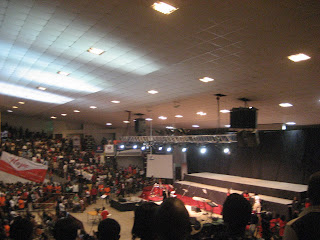
About a week ago there was a group of us from NEGST that went to an annual event called Africa Let's Worship. Its a worship service that goes from 9:00 pm until 6:00 am. Its big, about 10 to 15 thousand people big. We went 2 hours early to get seats, and by around 9 the church it was held in filled up and no one else could get inside. Thousands more were in tents outside the church.
I really enjoyed it. It was certainly high energy, and had quite a bit of technical trouble, including the power going out and the entire church going pitch dark, but it was a lot of fun. It was also very reverent at times, and we lots of time for prayer. We didn't stay the whole time, but left at 1 am. Next time I think I'd like to stay longer.

Alpheus and John as we were holding down the seats.

Friday, September 4, 2009
Somalia: A Libertarian Paradise
http://humanitarianrelief.change.org/blog/view/come_to_somalia
Here is an example of an article extolling the benefits of the Somali situation:
http://mises.org/story/2066
(for some reason the link doesn't show up on this one, you have to copy the address)
You want me to bring what?
- 7 laptops
- 3 digital cameras
- jeans
- shoes
- weights (the little magnetic ones you add to dumbbells)
- water filter part
- Hebrew textbook
- 1000 CDs
- an entire suitcase of textbooks for the bookstore
- credit cards (but I'm not buying these, just bringing them)
If I were to have brought all of those things back with me, if would have been roughly 200% of my total luggage allotment and would have cost around $3000. I am bringing back 3 laptops, 1 digital camera, the water filter part, the Hebrew textbook, and the credit cards. That's a bit more manageable. I must say, my favorite request was the 1000 CDs. It came less than a week before I leave for Nairobi...
Tuesday, August 18, 2009
Summer 2009
Then I flew back to Baltimore, was at home for a few days, then flew out with my family to Seattle to visit my grandparents and other relatives out there. I was there for two weeks, then flew to Chicago for a wedding Aug 1st. I was a groomsman (wearing a tux for the first time), and helped out with the preparations as much as I could. It was a good experience, and everything came together by the end. Then I spent the next week in Chicago with all my friends in the area, of which there are still a lot. It was awesome spending time with all of them. I miss Wheaton people. After that, my family picked me up and we drove up to the UP of Michigan, and stayed with my grandmother there. It was quiet and relaxing.
Tomorrow I’m helping my sister move down to college in Virginia, then the next day my friend starting grad school at George Washington. I have three weeks until I return to Nairobi and the craziness of life really picks up again…
Friday, July 10, 2009
Interview with Thomas from Liberia
So they were fighting all over, a battlefront all over. And this process was tense for every Liberians. And so the government troops almost relent in the middle of the war, but they kind of divided themselves, those who were able to submit to Charles Taylor troops came on his side and were fighting for him. So those who remained independent, they also formed their own group, then those who diverted from their own groups: so we had more than 5 different groups fighting the same civil war. So as a result, people would come from outside of the country and just form their own group, people would remain in America and begin to support group and they organize people and the people begin to fight.
Ok, as for the church, I think the main issue was that most of the members left and went exile, ok, like my church went to Ivory Coast, other people went to Guinea, some went to Sierra Leone, some went to Ghana, some went to Nigeria. So the few people that remained in Liberia where I was, some of them actually became apostate because of the situation they found themselves in. Some begin to mix Christianity with other religions. Some begin to go for protection, we saw Christians going to herbalist to get protection for gun-proof. Ok, so when you get the gun-proof you begin to fight for Charles Taylor I think you begin to lose your identity you Christian identity so many people backslid because of this issue. Some other people were carried away by peer pressure because your friend comes from the battle-front and tells you, my man, this thing is easy, if you go and fight nothing will happen. Just take your own time and just follow instruction. Some Christians even join their friends to fight the war. Ok, so the church was greatly affected.
[Thomas went to Ivory Coast as a refugee.] The Ivorians decided that since war is in our country, we left our country and entered their country we brought the ugly feeling and the ugly behavior with us. So any ugly thing that any Ivorian does, they would say, those Liberians are the ones behaving like that. So I decided to leave Ivory Coast.
So while the war was going on I entered Liberia, and there was some friends of mine who took… When I was a student at ABC I bought some produce, coffee and cocoa, so I kept it in my house, in my home town. But these rebels conquered the place and they begin to take my coffee and cocoa and bring it over to Ivory Coast to sell it. So I decided, I saw one of my friends who said, “Oh, your coffee you left over there is now for the rebels, and they are taking the coffee and selling it.” So I decided to go back and get my coffee because my family never had anything. So I crossed the river, I never went to the rebel side, I went down the river because Liberia is bordered by Ivory Coast and there is a big river that divides the two countries, so I went across the river downstream, and I was able to cross and get to my village. So I passed and went to the town, I saw some of the coffee even though they have taken some, but I took two bags and carried to our village and I hired people, we took it and brought it to Ivory Coast. I sold it, and I paid people to come back for the balance.
So when I came, I decided to actually be in Liberia, but the question that came to my mind is what am I going to do in Liberia when war is going on? But the way I observed the rebels, their behavior and other things, brought another idea, God spoke to me that I think I should be in the midst of these people and be able to talk with anyone that would be open to me. So I begin to evangelize. Yes. So from one person to another, I begin to talk from one place to another, from one village to another village, until I was able to establish 6 different preaching stations in different, different villages, ok. So these six different preaching stations, I went back to the Ivory Coast and brought one of my friends who worked along with me. So we used to walk like 13 hours in a day to go from village to village to evangelize. But the best thing I did was, I could not go from place to place like that without handling arm, ok, so I decided to go for their training. So I went, they trained me, and they taught me how to handle the gun, how to dismantle it, and how to assemble it. So they taught me everything, and I managed to get one from their main commander. So he gave me the arm, I just used to handle the arm and move from place to place.
I do not take part in anything that they do, but I always advise them when they were doing wrong and remind that that this country you see would never remain like this. Though you are killing some people, but other people would remain alive. You may kill a brother of another sister, and this sister will live to see you another time: what will you tell the person? So I was able to convince most of them, and I was able to relieve some other people that they arrested who were going to Ivory Coast, citizens leaving the country because of war, they were rescued and they want you to remain with them. And they don’t feed the people. So once you arrest somebody and you are not able to feed the person I would go there and say, “But if you keep this person the person will die. You either release them, or continue to feed them daily.” Now if you can’t feed them, then I will tell you, let them go. So I was able to help plenty of people.
Dr. Jusu
http://www.cisf.org/dr-john-jusu-sierra-leone
For any of you who might happen to be considering seminary, another reason to come to NEGST is to meet and learn from people like Dr. Jusu...
Thursday, July 9, 2009
Does Your Pastor Preach Like This?
These videos were taken a few months ago at the Life in Christ Outreach Ministries church in Kibera.
Cranmer's Eucharistic Theology and the Book of Common Prayer?
http://davidbawks.wordpress.com/2009/07/09/cranmers-eucharistic-theology/
Thursday, June 25, 2009
Third Term
I also have a lot of meetings and consultations, and of course it can be boring, but actually I have found that I do enjoy a lot of it. I like knowing how the school runs and hearing the inside story on things. Most meeting have actually been okay as far as length, but then the Senate meeting yesterday was seven and half hours, and I found that a bit long! I've researched such diverse topics as asbestos and GPA policies, and met with so many people over these issues. Raising money for the school to get charted by the Kenyan government, figuring out how to include all students in the graduation banquet, approving the leave of our employees, working on our financial systems and guidelines, handling various requests of the student council--these are all things I've had to do over the last few months. Leadership in a cross-cultural setting is really interesting, and presents a lot more challenges. Most things that are communicated are misunderstood. I've engaged in so much interpretation over what things really mean, the fine art of reading between the lines.
Since I am still a full time student, I have also had some classes to attend and assignments to do. This term I only took 14 hours, my lightest load yet, and I have had more difficult getting papers done this term than ever. At one point or another I was behind in each class, the first time I've turned in papers late at NEGST. I'm taking African Church History, Matthew 1-13, Introduction to Missions, and Introductions to Urban Missions. Matthew was the best, and hearing Dr. Wood's theology of justice was fascinating. Each term so far I've experienced a paradigm shift in my theology: 1st term, contextualization; 2nd term, power encounter; and 3rd term, Matthew and how justice is a huge theme in the Bible, and especially in the teachings of Jesus. I see it all over the place now. Justice really has never been emphasized much until I went to Wheaton, and then it was primarily social justice, which is obviously a big part of it, and really important, but I don't think its all there is to justice. This is something I certainly hope to continue studying in future.
Matthew has also taught me to be much more curious about what I read in the Bible. I've realized that there are so many things I've accepted at face value and never questioned, and when I think about why or what exactly it means, I have no idea. Like why was Jesus baptized? I found out that I really don't know, and I don't remember ever really considering that question. I wrote a paper on it and I still don't think I know. I mean, I do have some thoughts and ideas about it, its not completely meaningless, but there is a lot about it I think I'm missing.
Second term I was largely focused on my ministry involvement in Kibera, but I became too frustrated and had too many problems with the church and at the end of the term decided I could no longer continue there as an "assistant" pastor. Since then, I've been attending NPC (Nairobi Pentecostal Church) Woodley but I haven't really gotten involved. I hope to when I return in September.
I would also like to buy a motorcycle, and was planning to do so but the process of finding one and buying was just too difficult and I didn't have time to really shop around and find one. That's something else I will do in September, and although I must admit I am rather nervous about driving a motorcycle around here, I'm also really excited! It will be so awesome, and to have my own transportation... amazing.
Tuesday, June 23, 2009
Postmodernism and Development
As I’ve been researching my term paper for Intro to Urban Ministry, looking at development and urban ministry, I was somewhat surprised to find such a philosophical element to the development debate. There are many ways to understand and do development work, but one of the most prevalent is the modernization paradigm, currently being espoused as neoliberalism (according to David Simon, see below). I assume modernization in this context would be basically countries such as Kenya becoming “modern,” like the West, in the sense of getting electricity, roads, media, etc. The postmodern perspective critiques this idea as being problematic on many levels, such as the assumption that we are more “advanced” than others, and we then merely duplicate our lifestyles and impose them on others. Such issues as environmental sustainability also point to the consequences if everyone were to have an American standard of living: not good. Even looking at the current economic crisis, from my devout reading of NY Times columnists I get the impression that there is a systemic shift going on in American attitudes towards consumption and having a lot of “stuff”—most of which they don’t need. Showing off wealth by going shopping and buying ridiculously overpriced clothes and other things doesn’t seem quite as cool anymore.
Back to postmodernism, I hadn’t thought of its implications in this specific aspect; but I realize now that this “movement,” if it can be organized to that extent, affects all academic disciplines. Some of the conclusions arising from the postmodern critique of development end up in the realm of anti-development: it shouldn’t be done at all. Well, that is probably not the most helpful way to go about this issue! I found the following quote quite fascinating:
Most postmodernists and postcolonialists have great difficulty in embracing the concrete development aspirations of the poor in practice, despite their theoretical sophistication. Part of this trend is a growing retreat to the cosy Northern pavement café—a favoured haunt of those with panoptic vision(s)!—from the rigours and challenges of field research in the South, by hiding behind the conveniently hyped 'crisis of representation' of who has a/the right to speak or write on behalf of Third World 'others'. (Simon, 185)
This sounds quite a bit like the conversation going on theology concerning African identity and the nature of authentic, African theology (or theologies). Of course, it is true that we as outsiders cannot make their decisions or speak on their behalf, but in terms of development, does that mean we do nothing? And then of course there’s the whole debate over dependency and all its related problems, but I won’t be able to solve that here! I suppose I should get back to actually writing the paper, but I thought this was quite an interesting idea. I’ll leave you with this:
What I am suggesting is the importance of a healthy scepticism towards some of the more sweeping and emotive formulations of post-everything, which may universalize from particular case studies in a manner reminiscent of modernist theorizing, be elitist as practised by its advocates despite the supposed concern with precisely the opposite, and may actually be of little practical use in addressing poverty and providing basic needs. Moreover, critiques of conventional developmentalism and the search for more meaningful, appropriate and socially grounded and bottom-up alternatives are not new. As with the different definitions of development and the examples of basic needs and environmental sustainability given above, there is a long pedigree of initiatives and theoretical formulations stretching back decades… (Simon, 190)
(from David Simon, “Development Reconsidered; New Directions in Development Thinking,” Geografiska Annaler, Series B, Human Geography 79, no. 4 (1997): 183-201.)
Saturday, May 30, 2009
Getting Stuck [Mwanza part IV]
 On this side it looks fine.
On this side it looks fine. But there was this huge ditch on the other side we didn't see coming up the hill.
But there was this huge ditch on the other side we didn't see coming up the hill.
 We eventually dug under the vehicle, put the jack down below, lifted it up, filled in under the tire with stones, and backed up.
We eventually dug under the vehicle, put the jack down below, lifted it up, filled in under the tire with stones, and backed up.On the road back to Nairobi, we suddenly found ourselves stopped behind a whole line of cars. This is why.
We all tried to avoid getting splashed from the truck, but I got really muddy anyway.
The bus did make it through, but I was quite afraid it wouldn't, and would just fall over!
We finally escaped by driving out on the open field around the water.
Ha. Success. I've tried to do this post about 5 times over the past 10 days, and now it finally worked. Our faster internet finally came through, and it does make a difference. Ok, now the vacation is over. Now time to get back to school updates!
Tuesday, May 19, 2009
Mwanza [part III]
Monday, May 18, 2009
Mwanza [part II]
Mwanza [part I]
Therefore, this post is about Mwanza, where I spent the majority of my trip. Dr. Rasmussen, my professor for contextualization first term, asked if I would be interested in going to visit Mwanza, Tanzania, with them. He had been a missionary there for about 13 years, teaching at the Lake Victoria Bible College, before he moved up to Nairobi to teach at NEGST. After staying one night in Nakuru, I took the overnight bus to Mwanza, itself quite an experience. We left Nakuru at 1 am, got to the border around 7 am, and got to Mwanza around 2 pm. At one point, we were stopped for a long time, about 30 minutes I think. I didn’t know why were stopped, but the engine was just running and nothing was happening. After a while, people started to get upset, and they all streamed out of the bus, and one guy was like, come on, we’re going to go protest. I was like what!, but I went to see what was happening. They went out and started yelling at a police officer, and then the driver was in the little station on the side of the road filling out paperwork, and then a few minutes later he finished and then we went on our way.
 A village I saw out of my window. This is something I haven't seen much around Nairobi.
A village I saw out of my window. This is something I haven't seen much around Nairobi.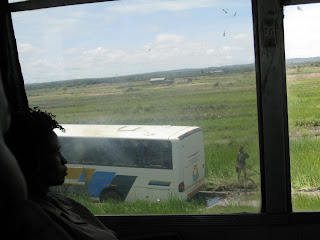 Another bus whose voyage appeared to be rather less fortunate than ours.
Another bus whose voyage appeared to be rather less fortunate than ours. We got a good view. It's a very hilly city.
We got a good view. It's a very hilly city.
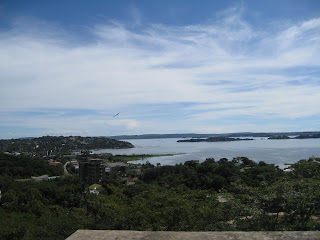 It reminded me of being out at Warm Beach Camp, north of Seattle, looking over the Puget Sound.
It reminded me of being out at Warm Beach Camp, north of Seattle, looking over the Puget Sound.
Monday, May 11, 2009
Transcending Epistemology: Towards a Postmodern Theology
http://scdalsgaard.wordpress.com/2009/01/10/postmodern-christian-theology/#comment-1292
Warning: it is a bit technical.
Friday, May 8, 2009
Staying in Nakuru
Tuesday, May 5, 2009
Slaughtering and Roasting a Sheep, part I
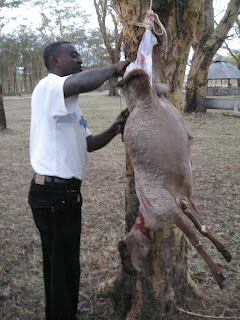 Esayas slaughtered it and skinned it the Ethiopian traditional way, and explained the significance of all the various parts. Parts of the fat, like on the rump, are really good and used for special purposes. Sleep are slaughtered for special occasions, like a wedding or the story of the prodigal son.
Esayas slaughtered it and skinned it the Ethiopian traditional way, and explained the significance of all the various parts. Parts of the fat, like on the rump, are really good and used for special purposes. Sleep are slaughtered for special occasions, like a wedding or the story of the prodigal son. It took hours to get it all ready and then to roast it, but it was quite good. We ate just about everything, except the lungs and the head. Some people even eat the head, they prepare it in some special way. They said the tongue was good, but we didn’t bother to cook it. I don’t know exactly what I ate, but I’m pretty sure I ate part of the heart, kidneys, intestine, and some of its four stomachs.
It took hours to get it all ready and then to roast it, but it was quite good. We ate just about everything, except the lungs and the head. Some people even eat the head, they prepare it in some special way. They said the tongue was good, but we didn’t bother to cook it. I don’t know exactly what I ate, but I’m pretty sure I ate part of the heart, kidneys, intestine, and some of its four stomachs. Edwin (pictured above) made a stew out the intestines, and it was really good, much softer than the rest of it, which can be kind of hard to chew.
Edwin (pictured above) made a stew out the intestines, and it was really good, much softer than the rest of it, which can be kind of hard to chew.  Overall,it was quite an experience, and I thought a lot about all the biblical images concerning sheep, like Jesus being killing as a sheep, and how we are like sheep going astray. We had devotions Sunday morning, which was Palm Sunday, and Dennis pointed out how the sheep was brought into our camp with great triumph, and we were all excited, taking pictures with it, and then led it away and killed it. Just like how Jesus entered Jerusalem and then was killed a week later.
Overall,it was quite an experience, and I thought a lot about all the biblical images concerning sheep, like Jesus being killing as a sheep, and how we are like sheep going astray. We had devotions Sunday morning, which was Palm Sunday, and Dennis pointed out how the sheep was brought into our camp with great triumph, and we were all excited, taking pictures with it, and then led it away and killed it. Just like how Jesus entered Jerusalem and then was killed a week later.
Thursday, April 30, 2009
Slaughtering and Roasting a Sheep, part II
Yes, I do realize I am starting with part II, and I didn't plan to break things up this much, but the internet is refusing to allow me to load more pictures. So we'll start with the second part of the process.
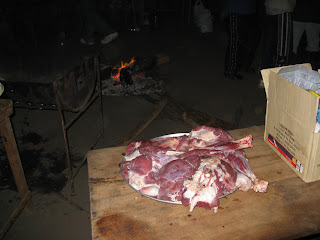 We ate just about everything, except the lungs and the head. Some people even eat the head, they prepare it in some special way. They said the tongue was good, but we didn’t bother to cook it. I don’t know exactly what I ate, but I’m pretty sure I ate part of the heart, kidneys, intestine, and some of its four stomachs. It was all really good.
We ate just about everything, except the lungs and the head. Some people even eat the head, they prepare it in some special way. They said the tongue was good, but we didn’t bother to cook it. I don’t know exactly what I ate, but I’m pretty sure I ate part of the heart, kidneys, intestine, and some of its four stomachs. It was all really good. That is some of its four stomachs, roasting away.
That is some of its four stomachs, roasting away. Philip was a chef extraordinaire. He spent hours over the coals tending the meat! Edwin also made a stew out the intestines, and it was really good, much softer than the rest of it, which can be kind of hard to chew.
Philip was a chef extraordinaire. He spent hours over the coals tending the meat! Edwin also made a stew out the intestines, and it was really good, much softer than the rest of it, which can be kind of hard to chew. 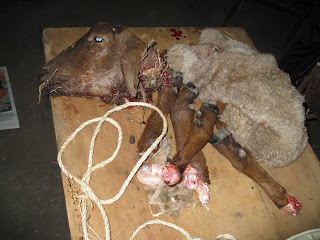 The remnants of our dearly departed (and tasty) friend.
The remnants of our dearly departed (and tasty) friend.Next time: part I... (and theological application)
Tuesday, April 28, 2009
Buying a Sheep
 One afternoon while we were there, Edwin suggested that we climb this small "mountain" to go swimming, so we did.
One afternoon while we were there, Edwin suggested that we climb this small "mountain" to go swimming, so we did. 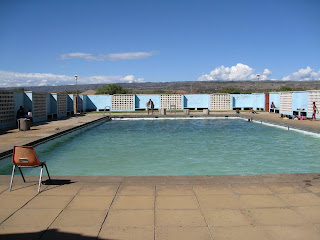 On the way back, we passed a shepherd herding a little flock along the road. Edwin had already mentioned that you could buy a sheep for 1000 shillings (about $13). That seemed a great deal, so we asked the guy about buying one. He demanded 3000, which did not seem as great of a deal. We actually decided against it, and started walking back, but then changed our minds as Philip saw I was disappointed and said I had to have a story to tell back home. Edwin ran after him and we finally got a sheep for 2000.
On the way back, we passed a shepherd herding a little flock along the road. Edwin had already mentioned that you could buy a sheep for 1000 shillings (about $13). That seemed a great deal, so we asked the guy about buying one. He demanded 3000, which did not seem as great of a deal. We actually decided against it, and started walking back, but then changed our minds as Philip saw I was disappointed and said I had to have a story to tell back home. Edwin ran after him and we finally got a sheep for 2000. 


I dragged it back to our camp, and it was somewhat stubborn, as I had heard about sheep.


Along the way back to the camp, we came across more animals. Philip was enjoying himself...

When we entered our camp, the paparazzi descended, and we all took our pictures with the sheep. Ok, the library is closing so I must leave. You'll have to check back to see what happens next...























